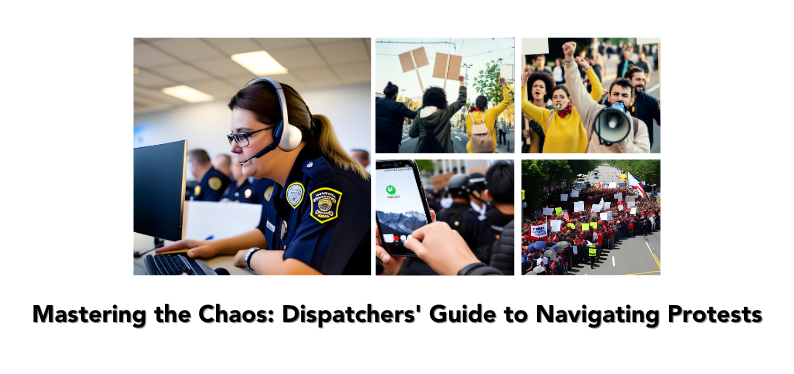Whether it’s a political protest or union strike, dispatchers play a crucial role in emergency response during protests, where the dynamic and potentially volatile nature of events can present unique challenges. As large crowds gather, emotions run high, and safety concerns increase. Dispatchers must efficiently handle a surge in emergency calls while ensuring the safety of both protesters and law enforcement personnel. Let’s break down the challenges faced by dispatchers and the helpful tips to help them navigate through these situations with composure and professionalism.
Challenges Faced By Dispatchers:
1. High Call Volume: Protests draw large crowds, and as tensions escalate, the number of emergency calls and requests for assistance can skyrocket. This surge in call volume puts immense pressure on dispatch centers, making it challenging to handle all calls promptly and efficiently.
2. Limited Information: During protests, callers may be emotionally charged or in distress, leading to fragmented and unclear information. Extracting crucial details from callers becomes essential for dispatchers to dispatch the appropriate response and allocate resources effectively.
3. Safety Concerns: Dispatchers must make quick decisions that consider the safety of both the protesters and law enforcement personnel. Violent or unpredictable situations may arise, requiring dispatchers to stay calm and composed while coordinating responses that prioritize everyone’s well-being.
4. Crowd Control and Traffic Management: Protests can disrupt traffic flow and create potential safety hazards. Dispatchers must work closely with law enforcement agencies to coordinate crowd control measures, manage traffic, and ensure the safety of protesters and the public.
5. Interagency Coordination: During large protests, multiple agencies may be involved in managing the situation. Effective communication and coordination between different entities is critical to ensuring a cohesive and unified response.
Tips for Dispatchers Working During Protests:
1. Stay Calm and Focused: Maintaining composure during stressful situations is crucial for dispatchers. Speak clearly and calmly while interacting with callers to gather essential information accurately.
2. Practice Active Listening: Engage in active listening to fully understand the caller’s situation. Repeat situational information back to callers to confirm the accuracy and ensure nothing is missed. Always ask the caller to repeat the address or cross-streets regarding the location, do not repeat these as the caller may be frantic and not be properly listening.
3. Prioritize Calls: Use effective triage techniques to prioritize calls based on the severity of the situation and available resources. Respond promptly to high-priority emergencies while managing lower-priority calls efficiently.
4. Gather Relevant Details: Ask specific and targeted questions to obtain crucial information, such as the location of the incident, the nature of the emergency, and the number of people involved. This will aid in dispatching the appropriate resources.
5. Stay Informed: Be up-to-date with protest locations, routes, and potential road closures. This knowledge will enable you to assist callers and responders effectively and efficiently.
6. Collaborate with Law Enforcement: Maintain a close and cooperative working relationship with law enforcement agencies. Sharing information and coordinating responses will lead to a more effect and unified emergency response.
7. Leverage Technology: Utilize technology tools available in dispatch centers to efficiently manage calls, track resources, and share real-time updates with responders on the ground.
8. Practice Non-Biased Dispatching: Remain neutral and unbiased in your responses to ensure that all individuals receive fair and equal treatment.
9. Follow Established Protocols: Adhere strictly to the established protocols and procedures in your dispatch center. Consistent and appropriate responses are vital during protests to maintain order and safety.
10. Continuous Training: Participate regularly in training sessions to enhance your skills and stay updated on new protocols and techniques related to managing protests. Continuous learning equips dispatchers to handle challenging situations more effectively.
Dispatchers working during protests face numerous challenges due to the dynamic and potentially volatile nature of these events. With high call volumes, limited information, and safety concerns, their role becomes pivotal in ensuring the safety and well-being of all individuals involved. By following these tips and maintaining a professional approach, dispatchers can contribute significantly to cohesive and efficient emergency response during protests.


Recent Comments